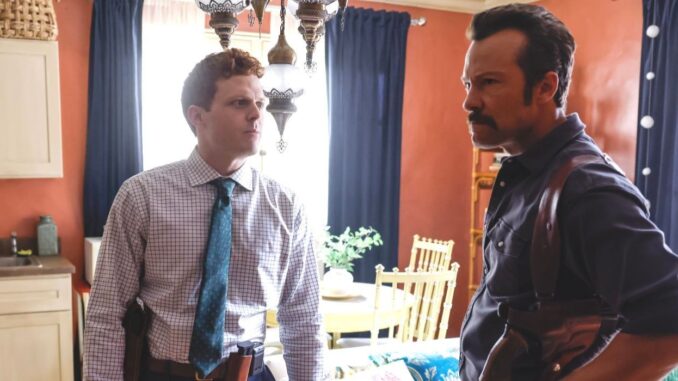
NCIS: Origins Season 1, Episode 18, “Cecilia” is the emotional haymaker that fans have been waiting for. The CBS spinoff has made its name on being emotionally intense and character-driven, so it wouldn’t make any sense for the season to end on anything but a deeply personal note. This hour delivers that, while also being a wonderful indicator of just how far both the characters and the actors playing them have come since the start of the NCIS prequel.
“Cecilia” is about young Gibbs trying to avoid prosecution for the murder of Pedro Hernandez, but it revolves around Cecilia “Lala” Dominguez and the position she’s put in because of the renewed investigation. When Lala’s old friend Lara Macy has Gibbs as her only suspect, Lala has to make some drastic decisions. It may not be the most heartbreaking episode of the season, but it’s almost like a pressure release as all that viewers have seen before has led up to this.

NCIS: Origins Delivers a Wonderfully Structured Season Finale
Season 1, Episode 18 Drops Almost All the Pieces Into Place
Something that may get lost in all the emotion is how well-written the NCIS: Origins season finale is. It’s very difficult to write a great finale: one that feels big enough and ties up everything, while still leaving somewhere to go and resisting the urge to throw in a cliffhanger to try and get another season. Co-showrunner Gina Lucita Monreal has structured “Cecilia” near-perfectly. The sole criticism of the plot is that fans know Gibbs can’t be arrested for Pedro Hernandez’s murder, since otherwise there wouldn’t be a series. And those who are NCIS viewers also have specific knowledge of what Lara Macy chose to do, so there are a certain number of cards already on the table.
Monreal mostly negates that feeling of false jeopardy by shifting the finale’s focus to the emotional stakes. For the viewer, it’s not so much about how much trouble Gibbs gets into with Macy, as it is the emotional fallout in his relationships with Lala, with Franks and even with his late family. The way Gibbs snaps at Macy when he’s defending the memory of Shannon and Kelly shows how fiercely he continues to care about them. His dynamic with Lala also reaches a tipping point, while several other characters have to make decisions about their own futures that feel organic, not like “because this is a finale” problems.
Leroy Jethro Gibbs (to Macy): I will not sit here and watch you walk on their graves to get where you want to go.
“Cecilia” also shows how much effort NCIS: Origins has put into respecting NCIS canon all season. The episode makes effective use of Lara Macy, another NCIS legacy character, while also making references to events that have taken place across the previous 17 episodes and even things that will happen in the future. Macy’s key piece of evidence against Gibbs is a callback to Episode 10, “Blue Bayou,” although she reveals new information that wasn’t seen in that episode. The brief montage of moments from the whole season would seem cheesy on another show, but here, it feels like a chance for the audience to be reminded just how much has happened in a fairly short period of time. This episode crosses all the I’s and dots all the T’s, and that is no small feat.
How NCIS: Origins Episode 18 Puts Gibbs and Lala’s Relationship Into Focus
Austin Stowell and Mariel Molino Continue to Shine
Many fans will be buzzing about the major Gibbs and Lala moment in NCIS: Origins Season 1, Episode 18, in which the duo almost kiss while in Lala’s neighbors’ swimming pool. The fact that they come so close and don’t kiss actually makes the moment more important than if they had crossed that line. So many TV shows automatically try to build in a “will they, won’t they” romance in order to generate the buzz that comes with shipping. But that moment isn’t about romance; it’s about how close the two characters are emotionally. Having Gibbs kiss Lala would put the focus on that and take away from his subsequent confession about turning his rifle over to Macy and essentially sacrificing himself for her and the other members of his team.
What “Cecilia” does do is highlight just how close Gibbs and Lala have become, and her importance to both the team and to Gibbs. It’s ironic that in the episode where her loyalty is questioned the most, viewers get the most appreciation for Lala. Her previous spotlight episode “Incognito” played too much with cliches about being a female agent. This episode is just about her as an individual, fighting for what she wants with everyone. Even Macy wants to use her as an intermediary. Lala was there for Gibbs when he pulled the trigger and shot Pedro. She’s been Franks’ right-hand woman. When Gibbs turns over that rifle, it’s him standing up for her. At the same time, one can totally understand her anger, because it’s a choice he made without her.
Lala Dominguez (to Gibbs): What you do affects other people. You just decide for everybody. Good luck with everything. I’m done.
Everyone needs that person who is always in their corner. Episode 18 shows how Lala is that person for the rest of the team, whether it’s trying to save Gibbs or advocating not to tell Randy about the murder, because he has a family. Viewers will now be worrying about if Lala is leaving NCIS: Origins ahead of Season 2, but she’ll have a strong presence next season one way or another. As the older Gibbs says over the shot of her wrecked car, he’s about to tell her story. She has made her mark in the NCIS world, and that’s one more reason why this episode works so well.
NCIS: Origins Season 1, Episode 18 Highlights the Show’s Growth
This Is Now So Much More Than a Prequel
The biggest problem with NCIS: Origins at the outset was that aside from Gibbs and Franks, all of the other characters felt underwritten. It was difficult to care about any of them as individuals, beyond how they connected to Gibbs’ story, because early episodes didn’t flesh them out as well. But that steadily changed after “Blue Bayou,” and the NCIS: Origins season finale winds up being an example of how far everyone involved has come. The actors all give solid performances, regardless of the size of their roles; Tyla Abercrumbie only has one significant scene as Mary Jo Hayes, but it’s a scene that highlights how memorable Mary Jo has become. It’s also fun to see King of the Hill veteran Toby Huss reprise his role as Regional Director Ron Barrett.
“Cecilia” feels like a marker to gauge all of the characters’ growth since they met. Franks is stuck in a dark place since Tish left him, and he’s going to end up deeper down that rabbit hole with his estranged brother phoning him (something the episode hints at before it actually happens, so it has proper context, which doesn’t always happen with fourth-act reveals). Randy wants to take a desk job after becoming a dad and having several guns pointed at him. When Lala confesses everything to Macy, it feels like she’s less trying to bargain with Macy and more trying to comment on how she sees herself. Everyone has changed — and it’s not all necessarily positive change. But these characters all finally feel alive. NCIS: Origins may have gotten off to a slow start, but the finale confirms its place as one of the best crime dramas on TV.